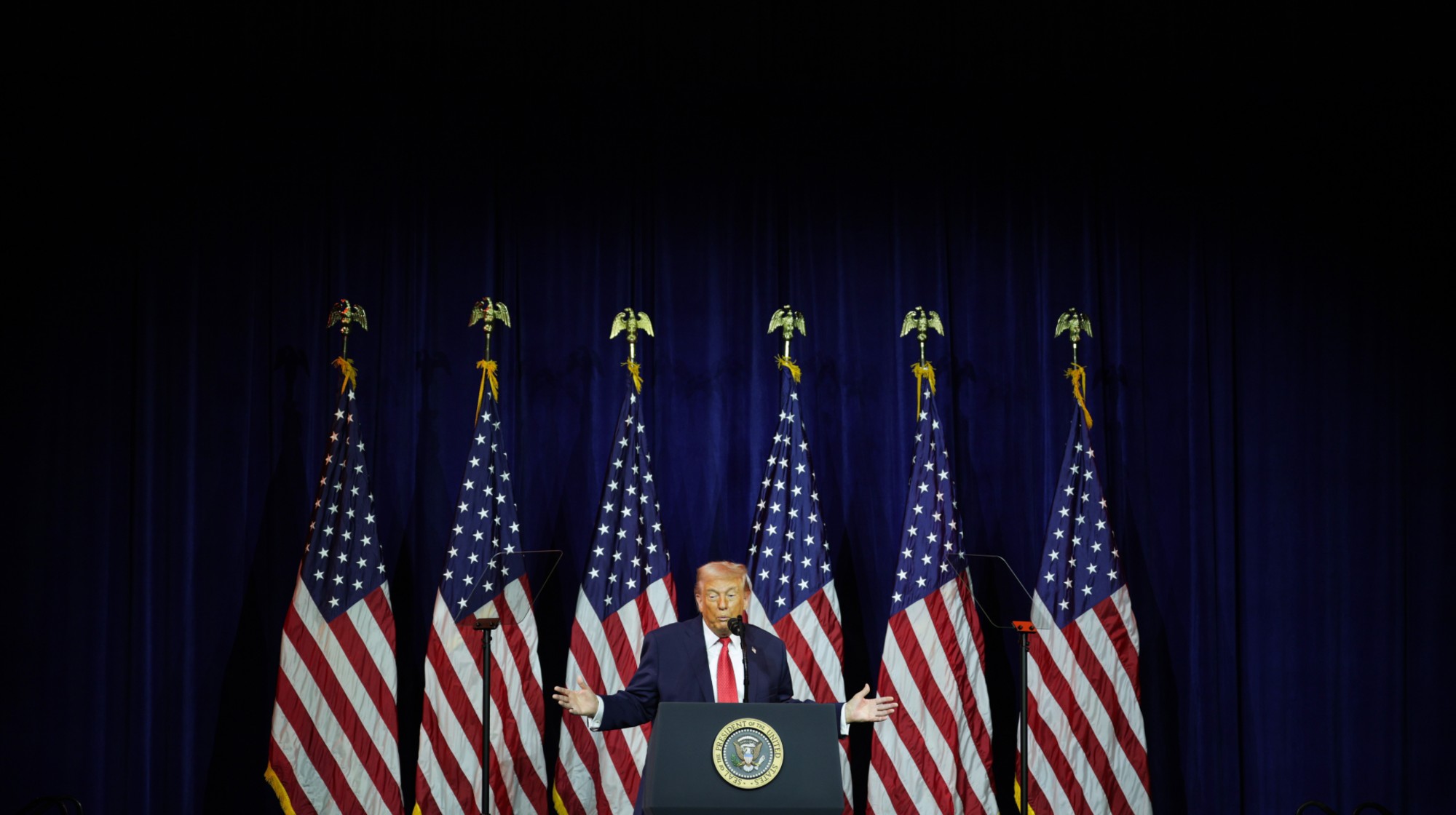What's the point of Trump's second impeachment trial?
Trump will likely be acquitted. But there's still merit in the impeachment process.


A free daily email with the biggest news stories of the day – and the best features from TheWeek.com
You are now subscribed
Your newsletter sign-up was successful
Donald Trump's second — and hopefully final — impeachment trial begins this week. Barring some unexpected development, we already know how it will end: The former president will be acquitted on the single charge of inciting the Jan. 6 Capitol insurrection that left five people dead. There just aren't 67 votes in the 100-member Senate to sustain a conviction.
"It's not a question of how the trial ends, it's a question of when it ends," Sen. Lindsey Graham (R-S.C.) said Sunday on CBS. "Republicans are going to view this as an unconstitutional exercise, and the only question is, will they call witnesses, how long does the trial take? But the outcome is really not in doubt."
Indeed, there seems to be a "let's just get this thing over with" air to the proceedings, which are expected to last only about a week. Democrats are torn between spending time and energy to hold Trump accountable and moving forward with President Biden's agenda, while Republicans clearly just want to move on.
The Week
Escape your echo chamber. Get the facts behind the news, plus analysis from multiple perspectives.

Sign up for The Week's Free Newsletters
From our morning news briefing to a weekly Good News Newsletter, get the best of The Week delivered directly to your inbox.
From our morning news briefing to a weekly Good News Newsletter, get the best of The Week delivered directly to your inbox.
So why have an impeachment trial at all?
For one thing, it is vital to get this history right, and right away. The Senate trial will document the events of the Jan. 6 insurrection, as well as why it happened — not just because of the "Stop the Steal" rally that preceded the riot, but because Trump and his allies spent the two months following the November election lying that it had been stolen from him, part of a bald attempt to overturn those election results and stay in office illegitimately.
"We think that every American should be aware of what happened — that the reason he was impeached by the House and the reason he should be convicted and disqualified from holding future federal office is to make sure that such an attack on our democracy and Constitution never happens again," Rep. Jamie Raskin, a Maryland Democrat who is leading the prosecution, told The New York Times.
Already, "alternative" stories about what happened on Jan. 6 are flourishing. The Wyoming GOP, for example, has falsely declared that the insurrection was "instigated by Antifa and BLM radicals," while Sen. Ron Johnson (R-Wis.) on Sunday baselessly suggested the impeachment might be a way for House Speaker Nancy Pelosi (D-Calif.) to divert the country's attention from her own, nonexistent culpability. The trial should dispel any such notions for Americans who are still interested in facts.
A free daily email with the biggest news stories of the day – and the best features from TheWeek.com
Believe it or not, there are still plenty of those folks. A new ABC/Ipsos poll says 56 percent of respondents agree that Trump should be convicted and prohibited from holding office in the future, while 43 percent disagree. The supporters include 92 percent of Democrats, which is no surprise, and also 54 percent of independent voters.
Just 15 percent of GOP respondents support conviction, but Trump seems to have slimmed his party's support considerably: Thousands of former Republican voters changed their registration in January, choosing instead to identify as Democrats and independents in swing states like Pennsylvania and Arizona. That suggests voters are imposing accountability on Trump and his party however they can. Senators have the power to impose a more immediate punishment, by prohibiting Trump from running for office again, and thus depriving him of the political leverage that goes along with that possibility.
Again, that probably won't happen. But the trial is still necessary — even if it doesn't result in a guilty verdict — simply because failing to even try is wrong. To accept the inevitability of Trump's impunity is to surrender to cynicism, to give up on the notion of ever getting justice for the grievous wrongdoing of our leaders, to shrug at an act that took dead aim at the heart of democracy. That just encourages the next wannabe authoritarian with designs on stealing an election.
Importantly, Senate Republicans who will vote for acquittal are not defending Trump on the merits. They're offering up constitutional dodges, engaging in whataboutism, or indulging in fresh rounds of conspiracy-mongering. For the most part, they aren't saying that Donald Trump is innocent of inciting insurrection. This week's trial puts them on the record. Let them explain — to their constituents, to the nation, to the judgment of history — why they're willing to give Trump a pass for intentionally doing injury to the constitution they are sworn to defend and uphold. The impeachment trial may not end in a guilty verdict, but it will bring clarity.
Joel Mathis is a writer with 30 years of newspaper and online journalism experience. His work also regularly appears in National Geographic and The Kansas City Star. His awards include best online commentary at the Online News Association and (twice) at the City and Regional Magazine Association.
-
 Bad Bunny’s Super Bowl: A win for unity
Bad Bunny’s Super Bowl: A win for unityFeature The global superstar's halftime show was a celebration for everyone to enjoy
-
 Book reviews: ‘Bonfire of the Murdochs’ and ‘The Typewriter and the Guillotine’
Book reviews: ‘Bonfire of the Murdochs’ and ‘The Typewriter and the Guillotine’Feature New insights into the Murdoch family’s turmoil and a renowned journalist’s time in pre-World War II Paris
-
 Witkoff and Kushner tackle Ukraine, Iran in Geneva
Witkoff and Kushner tackle Ukraine, Iran in GenevaSpeed Read Steve Witkoff and Jared Kushner held negotiations aimed at securing a nuclear deal with Iran and an end to Russia’s war in Ukraine
-
 Democrats pledge Noem impeachment if not fired
Democrats pledge Noem impeachment if not firedSpeed Read Trump is publicly defending the Homeland Security secretary
-
 The billionaires’ wealth tax: a catastrophe for California?
The billionaires’ wealth tax: a catastrophe for California?Talking Point Peter Thiel and Larry Page preparing to change state residency
-
 Trump fears impeachment if GOP loses midterms
Trump fears impeachment if GOP loses midtermsSpeed Read ‘You got to win the midterms,’ the president said
-
 Bari Weiss’ ‘60 Minutes’ scandal is about more than one report
Bari Weiss’ ‘60 Minutes’ scandal is about more than one reportIN THE SPOTLIGHT By blocking an approved segment on a controversial prison holding US deportees in El Salvador, the editor-in-chief of CBS News has become the main story
-
 Democrat files to impeach RFK Jr.
Democrat files to impeach RFK Jr.Speed Read Rep. Haley Stevens filed articles of impeachment against Health and Human Services Secretary Robert F. Kennedy Jr.
-
 Has Zohran Mamdani shown the Democrats how to win again?
Has Zohran Mamdani shown the Democrats how to win again?Today’s Big Question New York City mayoral election touted as victory for left-wing populists but moderate centrist wins elsewhere present more complex path for Democratic Party
-
 Millions turn out for anti-Trump ‘No Kings’ rallies
Millions turn out for anti-Trump ‘No Kings’ ralliesSpeed Read An estimated 7 million people participated, 2 million more than at the first ‘No Kings’ protest in June
-
 Ghislaine Maxwell: angling for a Trump pardon
Ghislaine Maxwell: angling for a Trump pardonTalking Point Convicted sex trafficker's testimony could shed new light on president's links to Jeffrey Epstein
